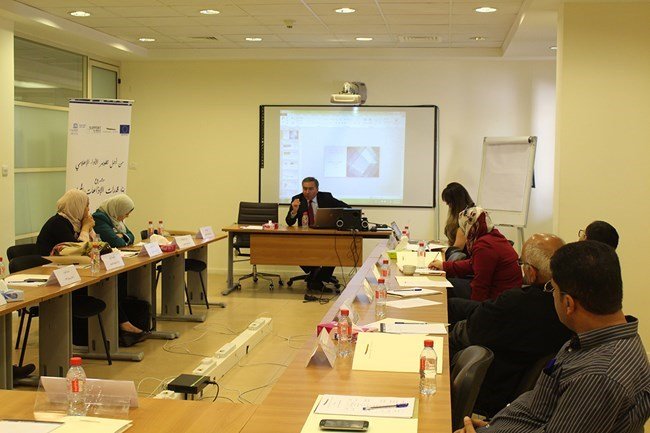Image:

12 Apr 2017
Amman -- Dr. Fares Braizat, expert in public opinion polls, has stressed that it is important for radio stations to conduct public opinion polls to identify public attitudes and trends because these polls provide guidance for the preparation and development of successful programs that are well received by audiences. Speaking during a workshop on building the capacities of local radios in the "development of radio programs," held by the Jordan Media Institute (JMI), in partnership with the Support to Media in Jordan program, implemented by UNESCO with funding from the EU, Dr. Braizat underlined the need for developing an effective strategic communication plan to create and attract an audience that communicates with the radio through designing programs that are suitable for it. This plan must be based on public opinion polls and market studies, which provide information and figures to decision-makers on the target audience.<br />
<br />
The two-day workshop, in which managers and other senior persons took part, is in implementation of the JMI plan, launched in 2016, to build the capacities of workers and volunteers at seven community radios in the governorates of the Kingdom that are participating in the project on "building the capacities of local radios." <br />
<br />
Dr. Braizat indicated that public opinion polls, which are based on solid scientific foundations and sound methodologies, answer the following questions: Who is the audience of the radio? How does it think? What times does it have and what are its trends in listening? Such opinion polls constitute a key reference for decision-makers to set their program policy and right plans for developing content and designing programs that meet people's needs. This will be based on professional foundations and will not be subject to personal whims or prevailing impressions, which are wrong most of the time. <br />
<br />
During the two-day workshop, a brainstorming session was held based on information derived from polls to develop three special programs at every radio and two joint programs that will be broadcast on all the target radios. <br />
<br />
According to Nihad Jariri, project director at JMI, the participants in the workshop discussed listening patterns in Jordan and the world and successful methods to design and formulate a program schedule, as well as the best style for running a radio station. At the conclusion of the workshop, there was a discussion of the programs that will be produced. <br />
<br />
She added that since the beginning of 2017, the JMI has carried out a number of training workshops and programs throughout the governorates of the Kingdom on producing field radio reports and preparing and presenting newscasts, besides radio morning shows. This is part of its comprehensive training plan, which is based on an assessment study conducted by a team of experts. The aim is for the local and community radios to actually benefit from the training and for this to reflect on their performance. This is done through developing the capacities of workers at these radios. Around 150 people are expected to benefit from the training programs.<br />
<br />
The courses proposed within the plan include a number of key topics, such as radio field reports, morning shows, news, documentaries, variety shows, and others. <br />
<br />
The target radios are Sawt Al Aqaba, Sawt Al Janub, Sawt Al Karak, Tafila Technical Radio, University of Jordan, Liqa FM/Zarqa, and Yarmouk FM/Irbid. <br />
<br />
It is worth noting that the JMI has started receiving applications for the MA program in Journalism and New Media for the year 2017/2018 until 6 July. <br />
<br />
For more information, please visit the website of the JMI www.jmi.edu.jo or call the following numbers + 962 6 5713304/6 <br />



